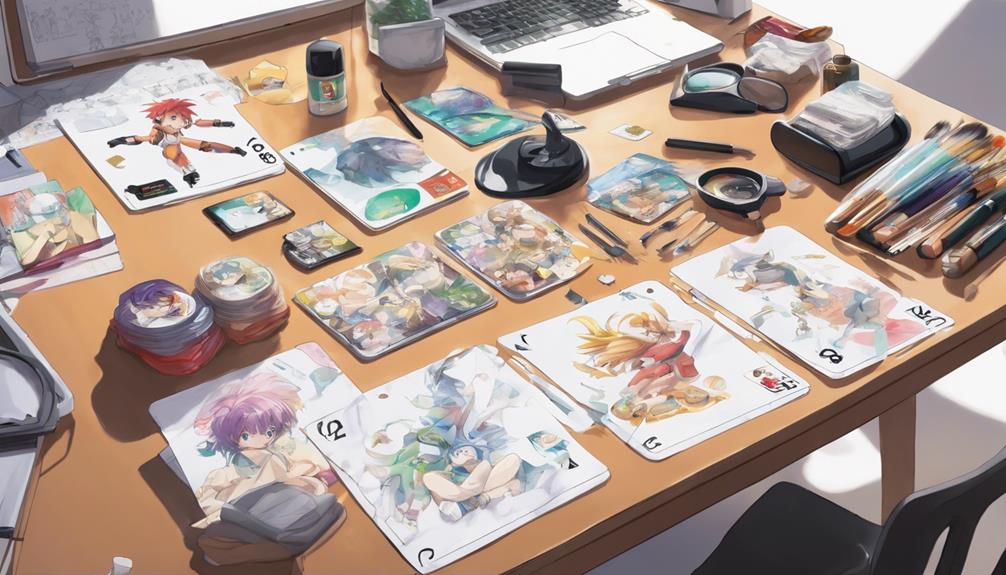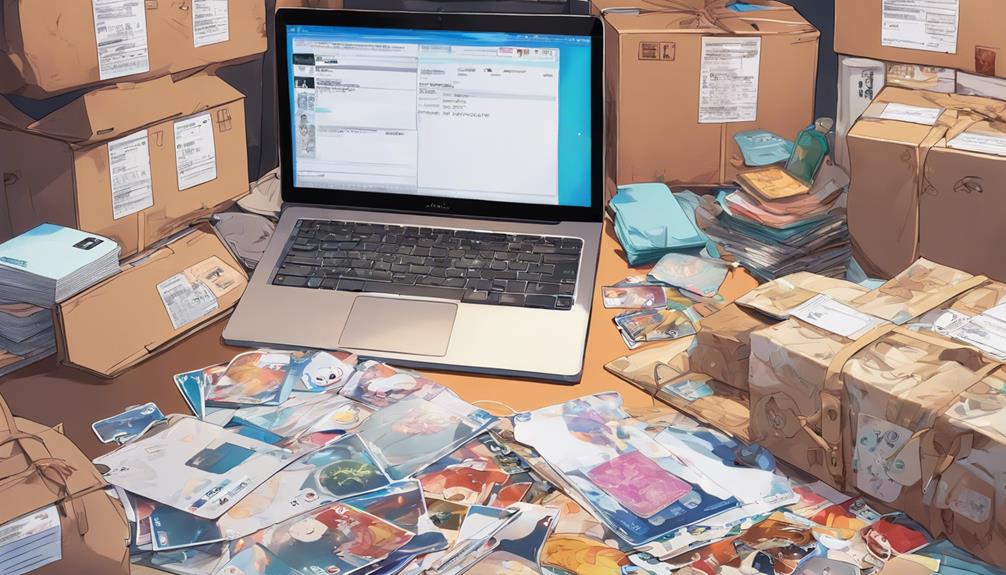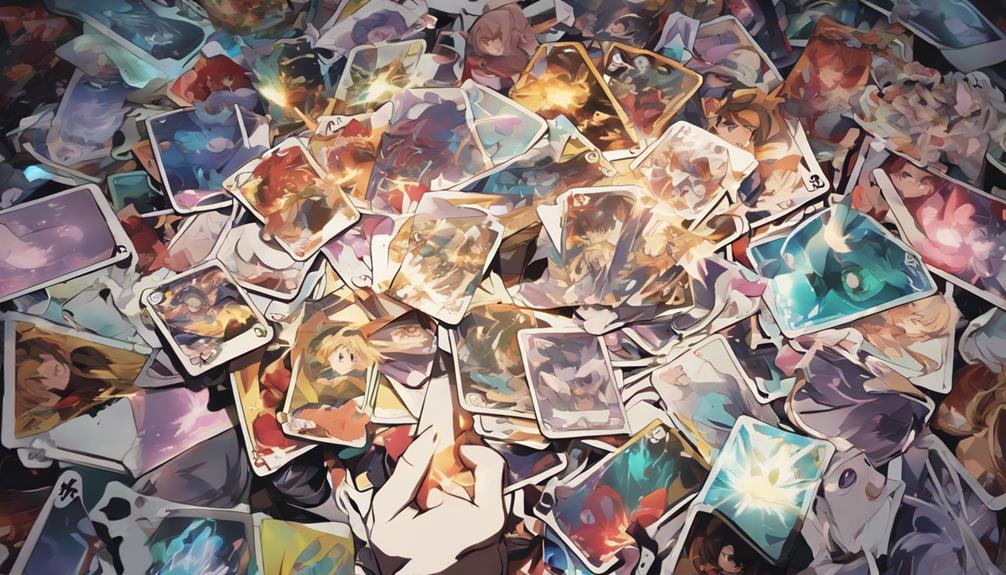You're about to submit your Pokémon cards for grading, but do you know what it takes to get a top grade? Start by selecting valuable cards with high rarity, holographic features, and excellent condition. Research reputable grading companies like PSA, Beckett, and ACE Grading, and carefully follow their submission guidelines. Inspect each card meticulously for imperfections, and package them securely for shipping. A high grade can greatly increase your card's value, so it's important to understand the factors affecting the grading process. As you navigate the world of Pokémon card grading, you'll discover the intricate details that set high-grade cards apart – and just what it takes to join their ranks.
Understanding Grading Companies
When considering authenticating and evaluating the quality of your Pokémon cards, you'll likely encounter two prominent names: Professional Sports Authenticator (PSA) and Beckett, both of which have established themselves as reputable grading companies in the industry.
These companies provide grading services that help establish the quality and value of your Pokémon cards in the market. As you contemplate getting your cards graded, it's crucial to understand the role of these companies.
PSA and Beckett are the leading authorities in the industry, and their grades can greatly impact the value of your cards. To grade your cards, you'll need to submit them to one of these companies, where they'll be evaluated based on factors like centering, corners, edges, and surface quality.
Beckett provides subgrades for these factors, giving you a detailed breakdown of your card's condition. By understanding the services and grading scales of PSA and Beckett, you'll be better equipped to navigate the world of Pokémon card grading and make informed decisions about your collection.
Card Condition and Authenticity
As you carefully examine your Pokémon cards, meticulously inspecting every detail under magnification lamps, you'll need to assess the condition of each card for factors like surface scratches, sharp corners, and solid edges. This is vital in determining the card's grade, as even minor flaws can greatly impact its value.
Authenticity verification is equally important, ensuring the card is genuine and original. Grading companies scrutinize every aspect, including centering, corner wear, edge quality, and surface imperfections. Even autographs on cards can influence the grade assigned.
To achieve top grades, your Pokémon cards must meet exceptionally high standards in centering, corners, edges, and surface quality. Remember, the condition and authenticity of your cards directly impact their value, so meticulous inspection is essential.
Preparing Cards for Submission

You'll need to meticulously sort and organize your Pokémon cards by value and condition before submitting them for grading, ensuring that each card is accurately evaluated and valued. This important step helps the grading service assess your cards fairly and efficiently.
Inspect each card under proper lighting to identify imperfections like scratches, whitening, and centering. Documenting these flaws is essential, so take high-resolution photos of each card to accompany your submission.
Proper packaging is also necessary to prevent damage during shipping to the grading service. Research the grading criteria of the service you're using to understand what they look for in card evaluation. This knowledge will help you prepare your cards correctly, ensuring a smooth grading process.
Factors Affecting Card Grade
As you examine the factors affecting card grade, you'll realize that the condition of your Pokémon card is vital, with even slight imperfections impacting its overall grade.
You'll need to assess the card's corners, centering, and surface quality to determine its condition, which in turn affects its grade.
Additionally, the rarity of the card also plays a significant role in determining its grade, making it essential to understand how these factors interact.
Card Condition Impact
When submitting your Pokémon cards for grading, it's important to understand that even the slightest variations in condition can greatly impact the final grade. Factors like border centering, corner sharpness, and surface quality play a vital role in determining the card's overall value.
You'll want to make sure your cards have even border centering, as this can lead to higher grades. Sharp corners and minimal whitening are also indicators of better grades, while balanced centering and corner condition greatly influence the value of your card. On the other hand, white spots and whitening can demote cards to lower grades.
When you submit your cards to a grading company, they'll scrutinize every detail, from surface scratching to border centering, sharp corners, and solid edges. These factors are important in determining the final grade, which ultimately affects the value of your card.
Rarity's Role
Rarity greatly influences a Pokémon card's grade, with the scarcity and demand of a particular card impacting its overall grade and value. When grading Pokémon cards, you'll find that rarer cards often receive higher grades due to their limited availability and high demand.
Limited edition or promotional cards, for instance, are usually rarer and can positively impact a card's grade. Cards with unique attributes, such as misprints or special editions, may also receive higher grades due to their rarity. You'll notice that highly coveted cards like Charizard or first edition prints are often graded more critically due to their rarity and demand.
Rarity can significantly influence the market value and desirability of a Pokémon card, affecting its overall grade and appeal to collectors. When grading Pokémon cards, taking into account the rarity of the card plays a significant role in determining its overall grade and value.
Submitting Cards for Grading

When submitting your Pokémon cards for grading, you'll need to carefully select the cards you want to grade, making sure they meet the grading company's criteria.
You'll also need to follow the submission guidelines, which vary by company, to make certain your cards are properly prepared and packaged for shipping.
Card Selection Criteria
To maximize the market value of your Pokémon cards, carefully select the most valuable and high-quality ones to submit for grading, as not all cards are created equal. You want to choose cards that are in mint condition, with sharp corners, even centering, and minimal surface imperfections. Consider factors like rarity, holographic features, and card condition when choosing cards for grading. Cards with vibrant colors and no visible wear will yield the best grading results.
When selecting cards, prioritize those with unique features, such as holographic foil or special editions. Additionally, cards in near-mint condition with minimal wear will be more desirable to collectors and, as a result, more valuable.
Submission Guidelines
You'll need to research and choose a reputable grading service, such as PSA, Beckett, CGC, or ACE Grading, to make sure your Pokémon cards are graded accurately and efficiently. Before submitting your trading cards, verify they're worth the grading cost. Select the most valuable cards in your collection, as the grading process can be costly.
Initiate the submission process online, where you'll list each card and securely package them for shipping. The grading service will inspect your cards for authenticity, condition, and assign a grade on a 1-10 scale. After grading, your cards will be encapsulated in plastic cases, labeled with details and grade for preservation and presentation. This process not only verifies your card's authenticity but also increases its value.
Grading Company Options
With your valuable Pokémon cards selected and prepared, it's time to explore the various grading company options available to you. As a Pokémon card enthusiast, you want to make sure that your cards are assessed by a reputable and reliable company. Professional grading companies like Professional Sports Authenticator (PSA), Beckett, and CGC offer services to evaluate and grade your Pokémon cards.
When choosing a grading company, consider their reputation, grading scale, and fees. PSA, for instance, uses a 1-10 scale to evaluate card condition and authenticity. Beckett, on the other hand, provides subgrades for different aspects like centering, corners, edges, and surface quality. These companies play an important role in determining the quality, value, and authenticity of your Pokémon cards.
Before submitting your valuable cards, research each company's submission guidelines and fees. You'll need to securely package your cards and send them to the chosen company for assessment. Remember, the grading company you select will ultimately determine the grade of your Pokémon cards, so choose wisely.
Interpreting Grading Results
Understanding what those mysterious grading results really mean, and how they impact the value of your prized Pokémon cards, is crucial.
Once you receive your grading results, it's important to grasp what they mean for your cards' value and collector interest. If you've opted for PSA grading, you'll receive a grade from 1 (poor) to 10 (gem mint) based on your card's condition.
Beckett grading, on the other hand, provides subgrades for centering, corners, edges, and surface quality, giving you a more detailed assessment.
High grades, such as PSA 9 and 10, can significantly increase the value of your Pokémon cards. In fact, these top-tier grades can command premium prices in the market.
To get the best options for your cards, consider ACE Grading, which offers a reliable and accurate assessment of your cards' condition. By understanding your grading results, you'll be better equipped to buy and sell Pokémon cards, ensuring you get the best value for your prized possessions.
Frequently Asked Questions
How Much Does It Cost to Grade a Pokémon Card?
When you decide to grade a Pokémon card, you'll face costs ranging from $18 to $50, depending on factors like card rarity, condition, and value, as well as submission options and pricing tiers.
How Do You Grade Pokémon Cards at Home?
'As you start on the journey of self-discovery, you'll find that grading Pokémon cards at home is an art that requires a keen eye, the right tools, and a personal touch. Inspect your card's condition, wield your grading tools like a magnifying lamp, and infuse your process with precision.'
Is It Worth Grading Pokémon Cards?
You're wondering if grading Pokémon cards is worth it. Consider this: grading highlights rarity impact, emphasizes condition significance, and enhances investment potential, making your cards more valuable and desirable to buyers, ultimately boosting their resale worth.
How Hard Is It to Get a PSA 10 Pokémon Card?
"You're chasing a unicorn when pursuing a PSA 10 Pokémon card, like finding a needle in a haystack. Rarity factors, such as flawless centering and surface quality, fuel grading anxiety, making the perfect condition a rare gem in the Pokémon card universe."



